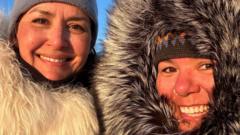The article delves into the intricacies of campaigning in icy conditions and cultural nuances in Nunavut as local Liberal candidate Kilikvak Kabloona vies for the parliamentary seat.
Navigating Elections in Canada's Icy Frontier: The Nunavut Experience

Navigating Elections in Canada's Icy Frontier: The Nunavut Experience
The unique electoral challenges in Nunavut, Canada's largest federal district.
In the remote northern reaches of Canada lies Nunavut, the country's largest federal district, covering a staggering 1.8 million square kilometers (695,000 square miles) and home to roughly 40,000 residents. Each of these residents will be represented by a single parliamentarian, a responsibility that weighs heavily on local candidates, particularly Liberal hopeful Kilikvak Kabloona and his campaign manager Kathy Kettler.
The ice-laden territory poses serious logistical challenges for campaigning. Kettler recounted a recent day spent airborne, traveling 1,700 kilometers (1,050 miles) to canvass in communities like Pangnirtung, Iqaluit, Rankin Inlet, and Arviat in dramatically frigid conditions—average winter temperatures in Iqaluit often dip below -24C (-11F).
“Very few people truly understand the realities of living here,” she stated, addressing the significant differences in culture and climate compared to southern Canada. Kettler hoped to bridge that gap while respecting local customs, noting that it is customary in their close-knit communities to enter a home unannounced—a practice she found peculiar as a campaigner.
As a member of the Inuit community from northern Quebec, she faced the additional challenge of communication, “We spend a lot on translating materials and hiring interpreters,” she said, emphasizing the importance of respecting the Inuktitut language, predominantly spoken in the territory.
While the national election themes largely revolve around Arctic security and sovereignty, Kettler pointed out that local issues are more pressing, primarily focusing on food security and survival. The exorbitant cost of basic necessities means that families often prioritize food over phone plans, making outreach a struggle.
The NDP currently holds this pivotal seat, with incumbent Lori Idlout seeking re-election and Conservative contender James Arreak in the mix. Coordinating the election itself also presents substantial hurdles. Elections official Jean-Claude Nguyen revealed the lengths they go to ensure ballots reach all areas, even remote gold mines.
“Our team flew out from Ottawa to get the ballots to them, completing a vital aspect of the electoral process,” Nguyen explained, underlining security measures that involve storing ballots with local authorities before they are transported to Iqaluit and then whisked away to Ottawa.
While navigating these logistical quagmires, which even include the threat of wildlife (as Nguyen humorously recalled a raven's intrusion on ballots in a past election), Kettler remained uplifted by the resilience and spirit of the local population. “The warmth and kindness of these communities is what energizes me in this campaign,” she reflected, emphasizing the meaningfulness of her work amid cold and challenges.





















